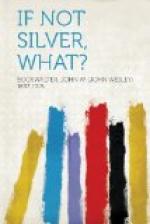Thus, despite the immeasurable advantages which England enjoyed, political, social, and industrial, her great colonial possessions from which she drew enormous wealth, and her exemption from destructive war; despite also the distressing condition of France and her recent enormous losses, we find that in seventy years of bimetallism the working Frenchman had gained wealth almost twice as fast as the working Englishman had in the same number of years of monometallism.
France became a creditor nation, and yielded to the general pressure for a single gold standard; she has lost heavily, as shown in her table of exports, but she still retains a large part of the momentum acquired during seventy years of bimetallism. Her wealth is still rated at something over $40,000,000,000; her people have accumulated stocks of the precious metals far in excess of those of any other country; and their business is so solidly founded that the storm which recently shook the foundations of credit throughout the British Empire scarcely produced a quiver in France. They have wisely avoided the excessive issues of faith money (or check money) which are the ever-present danger of England, America, and other monometallic countries; and as a result, they have almost entirely escaped those fearful convulsions have that threatened the political stability of great nations. In fact, it is no exaggeration to say that France has only felt the convulsions of recent years by their reflex action on her from other countries; and twice within very recent years has the Bank of England been compelled to go to France for the coin to stay the devastating work of panics resulting from over-expansion of faith money on an insufficient metallic basis.
France has an area less than that of Texas by some 60,000 square miles, yet its aggregate wealth is two-thirds that of the United States; and on the basis of assessed value her agricultural wealth is very much greater than ours. Mulhall, the great British statistician, says of France that she is “the best cultivated country in Europe.” Her 6,000,000 peasant proprietors are the owners of nearly all her cultivatable soil, which is worth, on an average, $160 per acre. She has over 400,000 miles of the finest common roads in the world, which have cost her, at the ordinary rate of labor, over $5,000,000,000. Their benefit goes chiefly to agriculture, binding the farmers of different provinces and farmers and city dwellers together. She has over 10,000 miles of canals and canalized rivers; she has 25,000 miles of railways, all in the highest state of efficiency. She has, during her bimetallic period, become the second colonial power of the world, and has acquired foreign territory at such a rate as to excite the jealousy of England. She has become the second naval power on the globe, and the second exporting nation, her exports averaging some $900,000,000 per year, an amount larger than the exports from this country, which has a population




